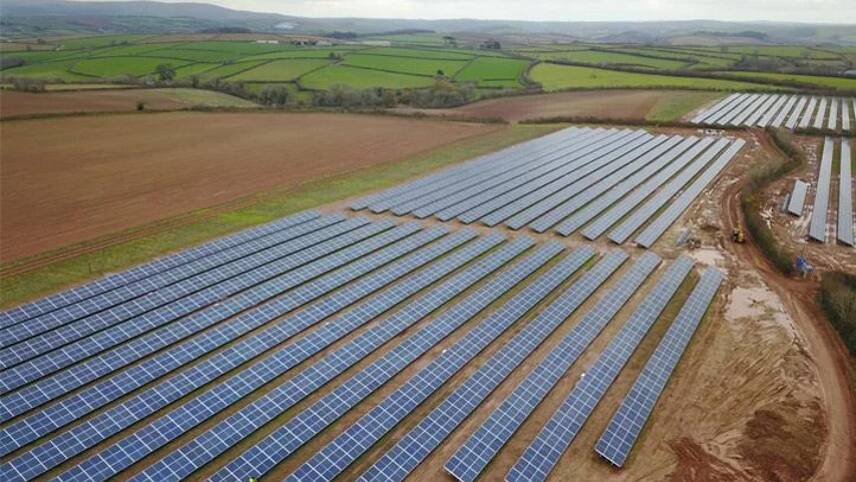Register for free and continue reading
Join our growing army of changemakers and get unlimited access to our premium content

The 7.3MW Creacombe community solar farm. Image: CORE
While the exiting Prime Minister Boris Johnson enjoys yet another holiday, leadership candidates Truss and Sunak have so far failed to articulate how they would tackle the rising costs of energy bills, which are expected to surpass the £4,200 early next year.
In response, the REA is calling on Johnson and the two leadership candidates to meet at an emergency energy crisis summit to deliver “real clarity combined with collective and decisive leadership” in order to avoid the “crushing cost of living consequences” and “spiralling inflation across the supply chain”.
Writing to the Prime Minister and the Conservative leadership candidates, Dr Nina Skorupska CBE FEI, Chief Executive at the Association for Renewable Energy and Clean Technology (REA), said: “Every week that goes by is precious time that is being lost. There needs to be real clarity combined with collective and decisive leadership – the country simply cannot afford to wait another month. That is why the REA echoes the calls for a crisis summit and the delivery of an emergency package of support.”
The REA argues that the Conservative leadership contest has taken place at a time when urgent policy intervention is required to tackle energy costs.
New research published on Tuesday (9 August) by Cornwall Insight has warned that household energy bill costs could surpass £4,200 early next year, bringing in fresh concerns that the UK is failing to respond to the energy cost and supply crises.
Building on those headline figures, analysis by the Energy and Climate Intelligence Unit (ECIU) has found that houses performing poorly on energy efficiency could face energy bills almost £1,000 higher than what the Government is targeting as a minimum standard for energy efficient buildings, prompting fresh calls for policy intervention to combat the energy cost crisis.
The ECIU has found that homes rated band F on the Energy Performance Certificate (EPC) system will likely have to pay gas bills that are £968 higher than those rated band C. The Government is notably aiming for the UK’s housing stock to reach a minimum on band C by 2035.
An ECO extension has been advocated by groups including the Sustainable Energy Association, Construction Leadership Council, National Insulation Association and EDF. However, to date, the Government has kicked the metaphorical can down the road on extending ECO. The current scheme ran out at the end of March 2022 and its next phase, due to run through to 2026, is yet to be finalised. The ECIU found that energy efficiency schemes such as ECO have contributed to savings of £1.2bn annually under the current cost of energy.
Solar scuffle
The REA has also hit back at Liz Truss’s claims that solar farm projects and developments should be replaced in favour of crops and livestock.
During the leadership campaign, Truss has been vocal of her displeasure around solar farms, labelling them as “depressing sights” and “paraphernalia”.
The REA warns that this is undermining the solar industry, which is concerned that more restrictive policies may be introduced in the future if Truss becomes Prime Minister. The Association notes that solar farms are planned and built in conjunction with crops and livestock and often provide co-benefits. Indeed, the independent National Food Strategy Review concluded that solar projects do not present a risk to the UK’s food security.
Mark Sommerfeld, Head of Power and Flexibility at the Association for Renewable Energy and Clean Technology (REA), said: “The language used so far over the course of the Conservative leadership race regarding solar and land use is deeply concerning, and the REA urges the candidates to recognise that solar farms do not encroach on agricultural land.
“The solar industry aims to work in conjunction with, not against, agricultural use of land, commonly by either building on marginal land or ensuring multi-land use applications. In doing so, it provides additional revenue to farmers – supplementing, not stopping, more traditional livestock and arable farming activities.
“Pledging to change planning laws to restrict further solar development would pose a serious threat to the jobs and investment created by the solar industry. It would undermine the UK’s ability to reach Net Zero and keep us locked in to expensive fossil fuels at a huge cost to households and businesses. Delivering more solar projects is not only an environmental imperative, but an economic one too.”


Please login or Register to leave a comment.